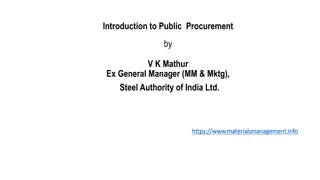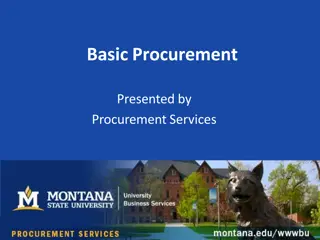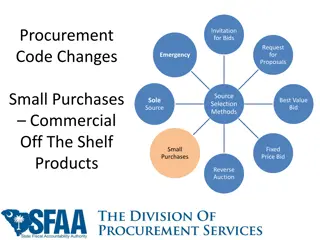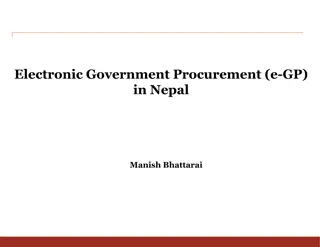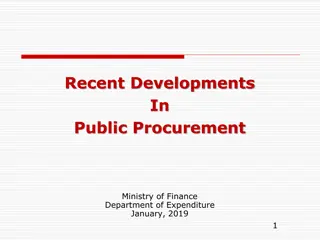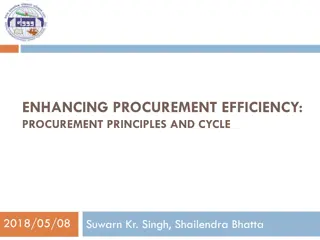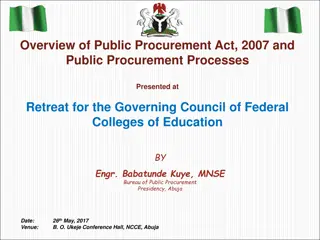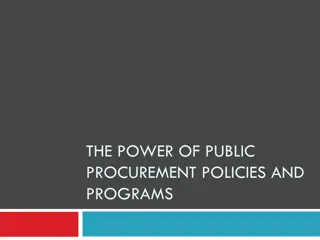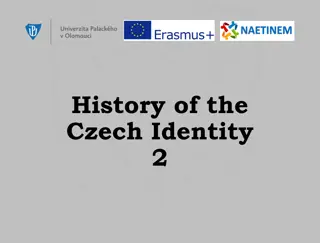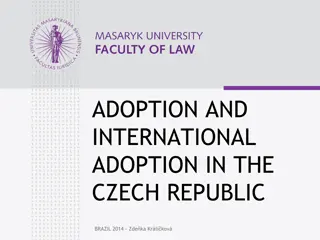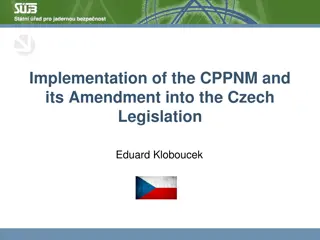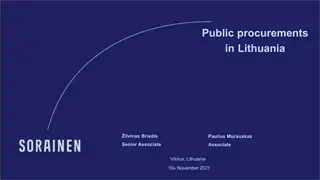Control and Review Procedures in Czech Public Procurement Law
Systems of control in Czech Republic related to public procurement, including bodies empowered to review, impose sanctions, and remedies. Details on fines, compensation for harm, court procedures, and review proceedings at the Petr Jedlika Office for the Protection of Competition (OPC) are discussed.
Download Presentation

Please find below an Image/Link to download the presentation.
The content on the website is provided AS IS for your information and personal use only. It may not be sold, licensed, or shared on other websites without obtaining consent from the author. Download presentation by click this link. If you encounter any issues during the download, it is possible that the publisher has removed the file from their server.
E N D
Presentation Transcript
Contract Contract amendment amendment and contract contract system system control in Czech Republic Czech Republic and control in the the Petr Jedli ka Office for the Protection of Competition ( ad pro ochranu hospod sk sout e)
Systems of control of public procurement (bodies empowered to review PP and impose sanctions and remedies) OPC Correctives Fines for administrative delicts (Law n 134/2016 Coll., on Public Procurement) ( OHS) Subsidy providers Recoveries (conditions of subsidy) Levies for violation of budget discipline (Law n 218/2000 Coll., Budgetary Rules) Tax authorities
Compensation for a harm (actual damage and lost profit) (Law n 89/2012 Coll., Civil Code) Courts are not bound by OPC s decision, but shall reflect it in the reasons of judgment, and vice versa Civil courts Criminal courts Law n 40/2009 Coll., Criminal Code (e. g. Art. 256 Ensuring an advantage when awarding a public contract, during a public tender and a public auction and others)
Review proceedings at OPC (related to contract modifications) After Before conclusion of contract: conclusion of contract petition against the practices of CA aimed at awarding a PC outside procurement procedure petition to impose a ban of performance of PC administrative delict
Review proceedings at OPC after after conclusion conclusion of of contract contract Administrative delict (Art. 268 of law n 134/2016 Coll.) Delict is commited, if: CA fails to comply with the rules for the award of a public contract whereby it has influenced or can influence the selection of an EO CA awards a public contract Result: fines up to 10 % of the public contract price, or equal to or less than CZK 20 000 000 where the total public contract price cannot be established Ex offo proceedings Most common as for modifications of contracts Commenced often on the ground of a motion
Review proceedings at OPC after after conclusion conclusion of of contract contract Ban of performance of contract (Art. 268 of law n 134/2016 Coll.) Implementation of Art. 2d of procedural directive n 89/665/EEC (ineffectiveness) enumerative list of grounds; in relation to contract modification those may be: CA has concluded a contract without prior publication, when obligatory (e. g. unlawful negotiated procedure without prior publication) CA has concluded a contract despite a ban on the conclusion of the contract stipulated by the law n 134/2016
Review proceedings at OPC after after conclusion conclusion of of contract contract Ban of performance Question of time: Once the contract is performed, the ban cannot be imposed (certainty of the other party to a contract) Petition may be filed not later than within six months from the conclusion of contract Interim measure may not be issued. Burden of proof Petitioner has to proove that the contract has been unlawfully ammended Costs: Petitioner shall pay a deposit amounting to CZK 200,000 (today app. 7 910 EUR) Petitioner must hurry, have enough information and money. >> Rarely used
Review proceedings at OPC after after conclusion conclusion of of contract contract Ban of performance Result: decision prohibiting performance of contract contract is void ab initio (ex tunc) Ban of performance is the only way to invalidate the contract on grounds of violation of law n 134/2016; this is without prejudice to invalidity based on other grounds (e. g. civil law grounds).
Review proceedings at OPC before conclusion of contract before conclusion of contract Prohibition of practices aimed at awarding a PC outside procurement procedure (Art. 253, 264(7) of law n 134/2016 Coll.) Petitioner must file objections to the CA, standstill period applies Petitioner must pay a deposit (usually a lump amount CZK 100 000, today app. 3956 EUR) Petitioner must specify a) the performance, which the CA intends to acquire b) the procedure the CA intends to use Real and concrete activity or expression of will must be performed (e. g. entering into negotiation, CJEU C-26/03 Stadt Halle) Result: decision prohibiting the conduct aiming at awarding outside PP when this decision is violated >> ground for ban of performance
Administrative delict Ban of practices aimed at awarding a PC outside PP Ban of performance
Frequented modifications in practice of OPC
Prolongations Prolongations of time limits of time limits for performance Deadline to commence the works Delivery deadlines Reasons: Outages of supplies (related e. g. to war) Bad weather (works: low temperatures) Extraordinary events (floods)
Rearranging payment terms Rearranging payment terms & prices prices Mitigation of suspensive conditions of payment Example: Drawing up project documentation. Before amendment, price for project documentation was to be paid after the permission for the project is issued. EO asked CA to change this term, because EIA bodies had additional requirements and the project couldn t be assessed in simplified EIA procedure. EO hasn t obtained any payment from CA for an unpredicted period of time. After amendment, half of price was to be paid after filing the petition for permission, and the second half after its issue. (Decision n OHS-S0129/2022/VZ, OHS-R0080/2022/VZ) Agreement on rising the contractual price Reasons: Economic situation of EO Government s measures (e. g. rising minimum wage)
Extending the scope of contract Extending the scope of contract Prolongation of service contracts Additional works, supplies, services
Non Non- -enforcing the claims enforcing the claims Monetary claims (penalties, damages etc.): CA lets the limitation period elapse. Non-monetary claims (repair of work, additional work): CA doesn t insist on exact fulfilling technical specification and doesn t claim repair. result: CA doesn t obtain what is provided in contract
Non Non- -enforcing the claims enforcing the claims Is it a breach of law by CA? Every EO is supposed to perform properly and in due time. If the other potential suppliers knew, that the CA permits delay or defects, they could have changed their decisions. Or situation foreseen by civil law? Every EO entering into PP may count upon civil law remedies: penalties, interest on late payments, damages. All potential suppliers have same conditions when considering whether to participate or not in the PP. What provision of Directive is violated? When does the CA enter into the breach of law? 1. Should CA should immediately enforce the claims? 2. CA is in breach of law, when the limitation period elapses. 3. After a proportionate period of time (enough to start enforcement)
Non Non- -enforcing the claims enforcing the claims Possible problems of review procedure Are the review bodies qualified enough (e. g. in civil law, in technical disciplines) to deal with this type of cases? Do the review bodies enough material and personal resources to deal with cases like defects of works, defects of complicated informational systems etc.?
Modifications of contracts Modifications of contracts concluded outside of procurement procedure concluded outside of procurement procedure Art. 72(4)a of the Directive: conditions which, had they been part of the initial procurement procedure Typically: Old, long-lasting, many times renewed service contracts, awarded outside PP There s no initial procedure as comparative criterion. Is the application of art. 72 actually possible?
Overall nature of contract Overall nature of contract (Directive, Art. 72(1)c ) What are the criteria of overall nature of contract? Is it different from subject-matter of public contract? (see judgement of Regional Court in Brno, case n 62 Af 15/2023) Construction instead of reconstruction CA intends to reconstruct an old building. During the works it turns out that a big part (app. one third part) is better to be pulled down and build again. Partial modifications of technical specifications CA purchases trolleybuses. Having obtained half of the supply the CA amends the contract in order to obtain partial trolleybuses.
Review clauses: clear, precise, unequivocal Review clauses: clear, precise, unequivocal (Directive, art. 72(1)a ) Are these review clauses or just proclamations? Are they precise enough? Prolongation of this time limit may be agreed on the ground of force majeure arisen, sudden and urgent operational reasons objective circumstances caused by third parties. Any provision of this contract may be modified in order to comply with the regulation of the new Planning and Construction Act, when it is published.
Review clauses: clear, precise, unequivocal Review clauses: clear, precise, unequivocal (Directive, art. 72(1)a ) Should they be reviewed (upon a petition) a) in the beginning of procurement procedure, b) or just when the clauses are applied (after conclusion of contract)? Supreme Administrative Court (case n 8 As 284/2022) held, that review clause are award criteria, therefore they may be reviewed (in proceedings initiated upon a petition) in the beginning of the procurement procedure, like any other award criteria.
Acccordance Acccordance of of tender and tender and contract contract May final contract divert from the tender? What if the modification would not attract additional participants if used in procurement documentation? Judgement of Supreme Administrative Court (case n 7 As 165/2020) Delivery time limit (contract for works) differed from the tender and from the procurement documentation it was postponed app. 7 months. SAC held that this diversion was clearly substantial and potentially discriminatory; Principles of non-discrimination and transparency are key, not the analogy with contract modification regulation.









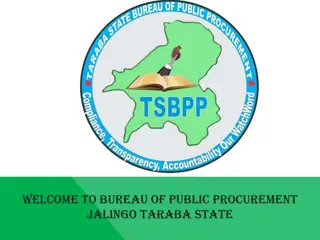
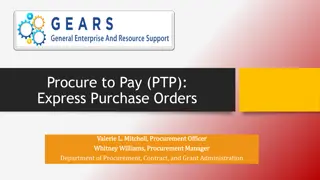
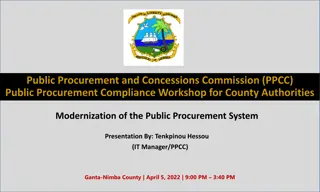
![Comprehensive Overview of Corruption Watch Submission on Public Procurement Bill [B18B-2023]](/thumb/138344/comprehensive-overview-of-corruption-watch-submission-on-public-procurement-bill-b18b-2023.jpg)
